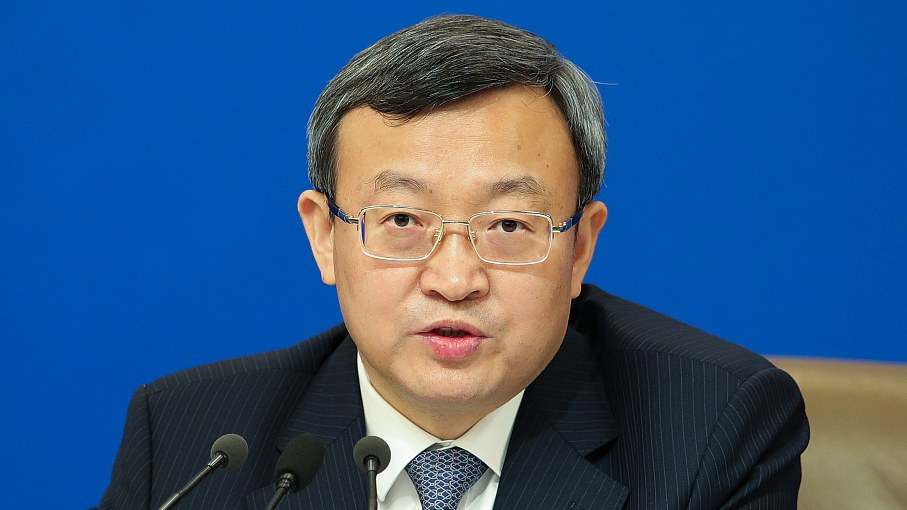
Opinion
10:49, 10-Mar-2019
The real meaning of China’s Foreign Investment Law
Robert Lawrence Kuhn

Editor's note: Robert Lawrence Kuhn, host of “Closer To China with R.L.Kuhn,” received the China Reform Friendship Medal, China's highest award. The article reflects the author's opinions, and not necessarily the views of CGTN.
With its new Foreign Investment Law, China backs up words with deeds. China has become the champion of globalization, propounding the overarching benefits of free trade, and by proposing to open up its own markets further and faster, China seeks to align its domestic policy with its international strategy.
Years in the making, China's Foreign Investment Law exemplifies the government's commitment to facilitate foreign companies doing business in China, which would enhance the kinds of market competition that benefit Chinese consumers.
Though specifics needed for full implementation are yet to come, the Law intends to give foreign businesses broader market access, protect their intellectual property, prohibit forced technology transfer, and guarantee equal treatment (a "level playing field") for foreign and domestic companies.
The development of the Foreign Investment Law offers insight into the legislative process in China. The Law entered the State Council's legislative plan for the first time in 2014, and since then it has traveled an uneven course of development.
In 2015, the Ministry of Commerce posted on its website a draft of the Law for the purpose of soliciting opinions, an increasingly common feature of “Chinese democracy,” where the people exercise de facto control over the purveyors of bad practice. In December 2018, the final draft of the legislation was published for public review and oversight.

Wang Shouwen, deputy representative of the International Trade Negotiation of the Ministry of Commerce of China. /VCG Photo
Wang Shouwen, deputy representative of the International Trade Negotiation of the Ministry of Commerce of China. /VCG Photo
The draft Law consists of 39 articles allocated into six sections: general provisions, investment promotion, investment protection, investment management, legal responsibility and other provisions. It stipulates that national and local governments shall upgrade their foreign investment services so that they become more convenient, efficient and transparent. Local governments are directed to abide strictly by policy commitments made to foreign investors and foreign-invested enterprises in accordance with the Law.
China believes that the Foreign Investment Law will become the most important legal milestone in China's continuing process of opening up to the outside world since China joined the World Trade Organization in 2001. The Law's prime objectives are to improve the openness, transparency and predictability of the investment environment for foreign investors.

The logo of Ernst & Young. /VCG Photo
The logo of Ernst & Young. /VCG Photo
Yet there is concern among foreign media and business leaders about how the Law will be implemented and enforced. The Law itself, in its current form, lacks required specificity – its 39 articles are down from 170 articles in the 2015 version (which was never passed); moreover, one-third of the 39 articles are a single sentence.
Thus, there would be ample room for the Law's “flexible application” in the hands of bureaucrats, especially interest-group bureaucrats, a condition that, as a practical matter, would be only marginally better for foreign businesses than the status quo.
On its surface, given the current codification of the Law – including a proviso that complaints would be heard in Chinese courts – foreign concern is justified, but I look to a stronger force, which is why I choose to remain cautiously optimistic. That stronger force is President Xi Jinping's deep commitment to promoting globalization and the fact that China's credibility as a champion of globalization will depend on the degree to which its domestic Foreign Investment Law is recognized and respected by the international business community.
It had been in January 2017, at the World Economic Forum in Davos, that President Xi gave perhaps the most meaningful, impassioned and well-received speech in defense of globalization, then under pressure, even attack, by U.S. President Donald Trump and other forces of populism and protectionism.
At the time, some foreign media criticized China for "talking the talk" of globalization but not “walking the walk” of applying to themselves the same principles of open markets and free trade that they were preaching to others.
I believe that President Xi is determined that China must continue to champion globalization, which is why China's Foreign Investment Law must be effective, and why, after it becomes the law of the land, foreign businesses must appreciate its change-making powers.
Much is riding on the Foreign Investment Law.
(If you want to contribute and have specific expertise, please contact us at opinions@cgtn.com.)

SITEMAP
Copyright © 2018 CGTN. Beijing ICP prepared NO.16065310-3
Copyright © 2018 CGTN. Beijing ICP prepared NO.16065310-3